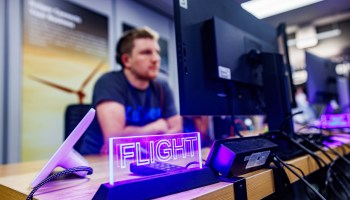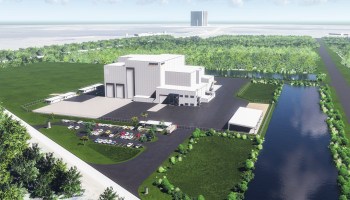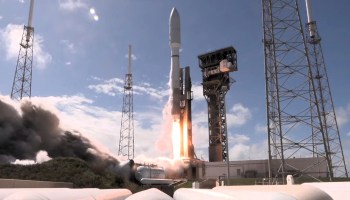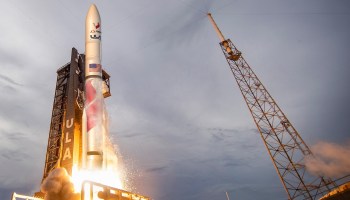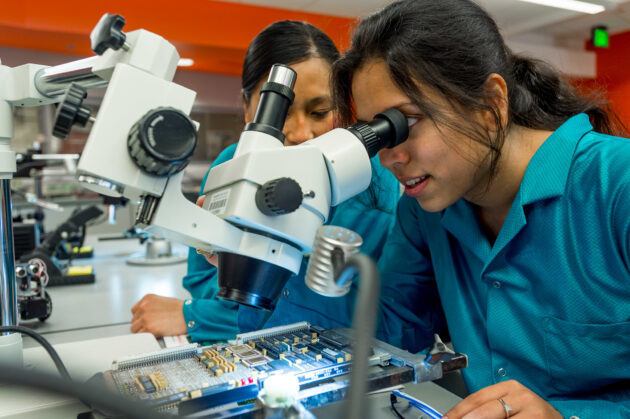
Amazon says it’s establishing a logistics facility in Everett, Wash., and partnering with a technical college in Kirkland, Wash., to boost the supply chain and workforce pipeline for its Project Kuiper satellite broadband network.
Project Kuiper is Amazon’s $10 billion effort to build and launch more than 3,000 satellites that will offer high-speed internet access to tens of millions of people around the world. The project already employs more than 2,000 people at Puget Sound locations, including a 172,000-square-foot satellite factory in Kirkland and a 219,000-square-foot research and development facility in Redmond, Wash.
Amazon’s partnership with Lake Washington Institute of Technology in Kirkland — which is less than a 10-minute drive from the satellite factory — takes the form of a satellite technician certificate program that will prepare students for careers in aerospace assembly and manufacturing.
Brian Huseman, Amazon’s vice president of public policy and community engagement, said in a news release that the partnership “will help create a pipeline of future satellite technicians to meet the evolving needs of this area’s thriving space and satellite sectors, and give more people the opportunity to take part in Project Kuiper’s important mission.”
Some of those technicians may find themselves working at the newly announced 184,000-square-foot receiving and logistics facility in Everett, which is a half-hour drive north of Kirkland. Amazon said the hub is due to come fully online by next month, and will bring about 200 skilled technician jobs to the Everett area.
“Our new Everett facility will be the single point of delivery for all externally procured materials and goods for Project Kuiper, and the entry point into the internal Kuiper supply chain,” an Amazon spokesperson told GeekWire via email. “It will enable the Kuiper team to support full-rate satellite production.”
Everett Mayor Cassie Franklin said she was “thrilled to welcome Amazon’s new Project Kuiper facility to Everett.”
“This investment not only strengthens our region’s reputation as a hub for aerospace innovation, but also creates valuable job opportunities for our residents,” Franklin said.
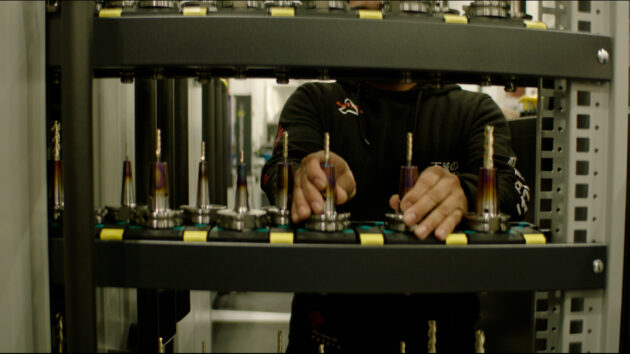
Project Kuiper is far behind SpaceX’s Starlink network when it comes to providing high-speed internet access from low Earth orbit. Over the past five years, more than 5,000 Starlink satellites have been built at SpaceX’s facilities in Redmond and launched into space to serve an estimated 2.7 million subscribers in more than 70 countries.
Amazon’s plans call for setting up a 3,232-satellite Project Kuiper constellation. Under the terms of Project Kuiper’s license from the Federal Communications Commission, at least half of those satellites have to be launched by mid-2026, with the remainder reaching orbit by 2029.
Two prototype satellites were launched and tested last year, but Amazon hasn’t yet announced the precise timing and detailed plans for launching the first production-grade satellites. Once the Kirkland production line ramps up to full capacity, Amazon expects to build up to five satellites per day.
“We’re making good progress, and expect to launch our first production satellites in the coming months,” a spokesperson said via email. “We expect to have enough satellites deployed by the end of 2024 to begin offering demonstrations to our earliest enterprise customers.”
Ramping up Lake Washington’s technician training program will also take a while. The program offers two 16-credit certification tracks — for Aerospace Assembly Specialist and Aerospace Manufacturing — that can be completed in two semesters total. Classes start in July.
The coursework will focus on safety protocols, aerospace assembly skills, materials handling, electrical systems, emerging technologies and industry-standard practices.
Amazon said members of the Project Kuiper team helped develop the program and coursework. Project Kuiper also donated 150 tools for use in the classroom and will provide regular guest lecturers for classes. The program will be run at least twice a year, with each program’s cohort capped at 25 students, Amazon said.
Amazon said it will include the two satellite certification tracks in its Career Choice program, which offers prepaid education and skills training programs for hourly warehouse employees.
“Industry partnerships like this collaboration with Amazon’s Project Kuiper are what makes our students so successful,” said Amy Morrison, president of Lake Washington Institute of Technology. “Together, we are providing real-world training for satellite technicians to work in the rapidly growing space industry.”
In other satellite broadband news:
- Amazon is asking the FCC to authorize an extension of Project Kuiper service to mobile vehicles, including cars, ships and airplanes. SpaceX won similar FCC clearance for mobile Starlink services in 2022.
- PCMag.com reports that SpaceX will raise the monthly service price for some residential Starlink users from $90 to $120 after reclassifying their service areas as having “limited capacity” instead of “excess capacity.”
